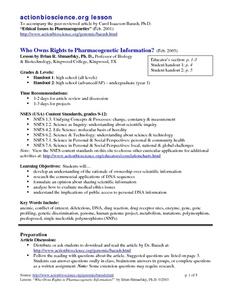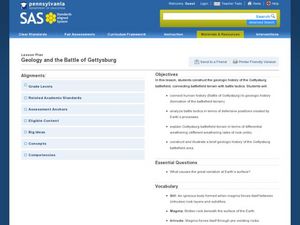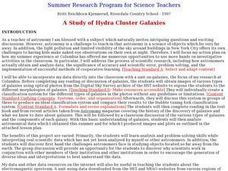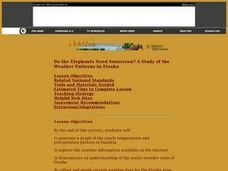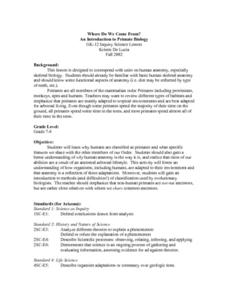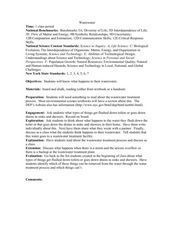Curated OER
Farming Fantastic Friends
Seventh graders demonstrate scientific inquiry to design and perform an experiment involving Grow Creatures. They participate in a class discussion, and in small groups design an experiment that determines how to change the materials to...
Curated OER
Measurement: Length, volume, and temperature
Young scholars determine the temperature of the water in a cup, measure the length of a piece of cardboard, and measure out an appropriate volume of water. This task assesses student's abilities to perform measurement and reporting skills.
Curated OER
Classification: Dichotomous Key
Learners explain the classification process of organisms. In this biology lesson, students practice writing the names of organisms scientifically. They answer the dichotomous key and discuss answers as a class.
Curated OER
You Light Up My Life: Developing a Scientific Theory for What Fuels a Candle's Flame!
Young scholars examine how candles work and how scientific theories are developed and tested. Students propose hypotheses about what is burning in a candle then perform tests in order to develop their scientific theory. After a teacher...
Curated OER
The effectiveness of Antacids
Students design and conduct a scientific experiment to test which of four antacids would be most effective for neutralizing acids. They rank the antacids in order from most effective to least effective and explain how they determined...
Curated OER
Species Interactions
Students study the scientific concepts of biodiversity and conservation through the use of basic equations of population growth and hands-on experiments/simulations. The lesson includes a take-home assignment which can be used for final...
Curated OER
Who Owns Rights to Pharmacogenetic Information?
Students develop an understanding of the rationale of ownership over scientific information. They research commercial applications of DNA sequences. They analyze how to evaluate medical ethics issues.
Curated OER
Geology and the Battle of Gettysburg
Young scholars create geologic maps of the Gettysburg battlefield. In this geologic skills lesson, students consider the variations of Earth's surfaces and explore strategies employed by the North and South in the Battle of Gettysburg to...
Curated OER
Exploring Big Bang Evidence
Ninth graders study the Big Bang theory. In this big bang theory lesson students research the Internet and complete several activities and create a presentation.
Curated OER
Bluebirds Project
In this bluebirds project worksheet, students are given directions on completing a project about bluebirds including measurements, scientific method questions, data entry, and more. Students complete 15 exercises.
Curated OER
The Solar System: Why do we Explore?
Third graders act as scientists. In this property discovery lesson, 3rd graders explore the substance "Oobleck" (cornstarch, water, food coloring). They work in groups to investigate the substance and make observations as a scientist...
Curated OER
Learning about air
Learners read a book and have a class discussion about the air around them. In this air lesson plan, students learn about properties of air, and discuss other gases they have observed.
Curated OER
Surface Tension
Students study surface tension and determine if soap and heat will affect surface tension. In this tension lesson students complete a lab, make a hypothesis and answer questions.
Curated OER
Fueling Around with Energy: A Comparative Study of Conventional and Renewable Energy Use Among Nations
Ninth graders examine the relationship between energy and society. In groups, they define energy sources as renewable or conventional and research how each method contributes to the world's energy. They write about how the patterns of...
Curated OER
Fueling Around with Energy: A Comparative Study of Conventional and Renewable Energy Use Among Nations
High schoolers compare and contrast renewable and conventional energy sources. In this energy lesson, students research about conventional fuel and present a persuasive argument about their stand on the issue.
Curated OER
Exploring Bloom's Taxonomy Through Eric Carle Collage Technique
Students participate in shared readings of Eric Carle's books and investigate the art and story elements. They create a collage and answer questions.
Curated OER
Lord of the Rings - A Study of Tree Rings
Students examine trees and discuss how the environment effected the tree. They also predict what the area look like in fifty years.
Curated OER
A Study of Hydra Cluster Galaxies
Students analyze a designated galaxy with a partner or in a small group.
Curated OER
Do the Elephants Need Sunscreen? A Study of the Weather Patterns in Etosha
Learners analyze the weather patterns in Namibia. They create a graph of the yearly temperatures and use the internet to gather information. They discuss how the weather goes in cycles in the area.
Curated OER
Case Study Two: Shark Dissection
Young scholars read an article on sharks prior to beginning a dissection lab. As part of the lab, students identify differences between the shark anatomy and human anatomy and hypothesize why those differences exist.
Curated OER
MAISA and the REMC Association of Michigan
Students complete online research to study geography's impact on weather. In this geography and weather lesson, students research weather in their city for ten days using an online website. Students bookmark the site, enter data into a...
Curated OER
Where Do We Come From? An Introduction to Primate Biology
Seventh graders explore skeletal biology. Through a discussion and video observation, 7th graders investigate how the anatomy is adapted to the environment. Students study primates and explore their characteristics and behaviors.
Curated OER
Wastewater
High schoolers discuss what happens to their wastewater. They read about the wastewater treatment process. Students are asked what types of things get flushed down toilets or goes down drains in sinks and showers. They are taught what...
Curated OER
Studying Aquifers in Outcrop
Students describe two or more different rock types found in outcrop. Students look specifically at the hydro-geologic properties of the rocks and complete the lab with a paper explaining a scientific phenomenon in layperson terms.








